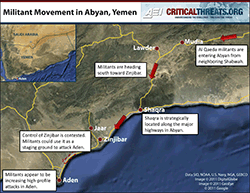 |
The violent crackdown in Sana’a continued into a second day. Protestors have entered Kentucky Roundabout, which had previously been a dividing line. At least 23 people have been killed today, most on Sana’a’s central Hayel Street. Witnesses reported that pro-government snipers killed three protestors from the rooftops. Medics reported that three of the dead included defected soldiers. All roads leading to Tagheer (Change) Square in Sana’a remain closed. Witnesses have widely reported the use of .50-caliber machine guns and anti-aircraft guns by pro-government troops. Defected troops from the First Armored Division clashed with loyalist troops near al Zubayri Street. First Armored Division troops fired artillery at government positions. Earlier, some of the defected troops had also attempted to prevent the protestors’ advance, apparently to limit the bloodshed. Clashes between Hashid tribesmen and loyalist troops continued for the fourth day in al Hasaba district. Hashid tribal confederation leader Sheikh Sadiq al Ahmar issued a statement saying that he has not broken the truce, but that provocations will not go unpunished.
A delegation from the UN and the Gulf Cooperation Council arrived in Sana’a to organize the transfer of power. A Yemeni government spokesman has indicated that the delegations will be seeking to push for the transition to occur quickly. President Ali Abdullah Saleh has denied responsibility for Sunday’s deaths, claiming that only teargas and water cannons were used by government troops. Yemeni Foreign Minister Abu Bakr al Qirbi said in a speech to the UN Human Rights Council, “The government of Yemen expresses its sorrow and condemnation for all acts of violence and bloodshed as those that happened yesterday in Sanaa. The government will investigate and hold accountable all those in charge of these acts.”
Yemeni security forces and protestors clashed in Taiz. Over a dozen people have been injured. Local sources reported that two protestors were killed. Three protestors were wounded in similar clashes in Aden, where protestors had burned cars and erected roadblocks.
Fighting east of Zinjibar killed six al Qaeda-linked militants. Three soldiers were wounded. The governor of Ma’rib, Naji abdul Aziz al Zaidi, said that two commanders of al Qaeda in the Arabian Peninsula were killed in recent fighting in Zinjibar. According to al Zaidi, the commanders were within the top 30 of the organization.
A resolution to the political crisis in the capital will not end the fragmentation of the Yemeni state, which remains at risk of a broader armed conflict. The current situation has increased al Qaeda's operating space in Yemen.
Please sign up for the Quick Take to receive these updates by email.
